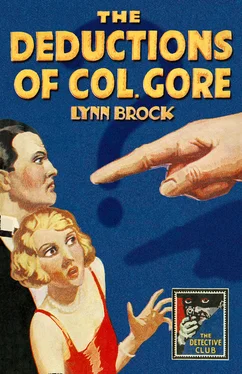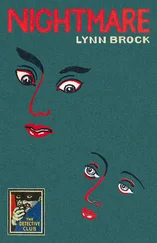But at that hour the bar had long closed its doors for the night; the wan illumination of an arc-lamp suspended above its portals accentuated its effect of cold inhospitality. One window of the seven that looked up Selkirk Place was still, however, lighted up. A shadow moved across the yellow blind as he passed—possibly the shadow of the tawny-haired Hebe who presided over the bar, and of whom Gore had caught glimpses as she went to and fro across the annexe between her domain and the main building of the hotel. Rather a pretty little thing, he had noticed, if somewhat excessively embellished; not too severe, either, to refuse a smile in return to his ‘Good-morning’ or ‘Good-afternoon.’ Betty, he had gathered, was her name—Betty Rodney. Rather a pretty name. He yawned, crossed the grounds, and was admitted into the annexe by the night porter.
‘I want to get a couple of letters off in half an hour or so,’ he said, when the man had roused his sitting-room fire, ‘if you’ll leave the door into the gardens open for me, I’ll stroll up myself and drop them into the box in Selkirk Place, when I’ve written them.’
Left alone, he manufactured himself a modest whisky-and-soda and seated himself to compose with its aid and that of a very terrible pipe, applications for two vacant positions for either of which, it seemed to him, he might hope to be considered as eligible as the next fellow. One was the secretaryship to a small London club devoted to the consolation of the Very Poor of the Services; the other the secretaryship of a golf club in Hampshire. A cheerful fire glowed and crackled soothingly; there was no other sound to disturb his efforts at ingratiating composition. Presently he finished his drink, knocked the ashes out of his pipe, refilled it, and slewed round in his chair to regard the fire-irons thoughtfully. On the uppermost page of his writing block the words—
‘RIVERSIDE, HOTEL,
‘LINWOOD, WESTMOUTH.
‘ Nov . 6, 1922.
‘GENTLEMEN,—’
lay reproachful and forgotten.
‘If the door is shut, go away. I may not be able to manage tonight. I will ring you up tomorrow at eleven if not.’
That was what she had said, furtively, nervously, under cover of the clumsiest interest in the chrysanthemums. And Barrington, as cool and cocksure as be-dam, had said, ‘It will be open.’
What door? When was it to open? What the devil did it mean?
What the devil could it mean? Was it possible that, in her own house—under her husband’s very nose, Pickles—the Pickles whose image, idealised, no doubt, in parts, yet always extraordinarily vivid, had cheered him and bucked him up and made him feel a bit better in even the darkest hours of the past nine years—was it possible that she was playing the rotten, silly old game—carrying on with that sleek-headed— Gore’s private surmise used at that point an epithet of Anglo-Saxon vigour which it instantly deprecated. No. The thing was incredible.
Incredible—unthinkable. A bit of a flirtation, perhaps—perhaps not even that. He drew a breath of relief to find his loyalty to the Pickles of the old days still staunch enough to hold her clear in the face of any suspicion, however insidious.
Straight as a die she had always been—in everything. It wasn’t possible that she could have changed—could have become one of those treacherous, loathsome little cats whose exploits filled the papers nowadays. There was some quite simple explanation of that remark of hers about the door. There must be. It was pretty rotten of him to have believed anything else for a moment, he told himself—the sort of thing one might expect from some half-baked young cub eager to sniff out filth in every corner. He turned, rather peevishly, in his chair, took up his pen, dipped it in ink, and resumed his correspondence with determination.
The son, the grandson, and the great-grandson of soldiers, he had found himself at his father’s death a subaltern in his father’s old regiment, with exactly two hundred a year in addition to his pay. To most people, since the average income of the men in the Westshires was some ten times that amount, such a position would have appeared embarrassing. He had contrived, however, to endure it with fortitude, aided by a practically imperturbable smile, a useful dexterity in all sports and pastimes beloved of youth, and a quite special brilliancy as a polo-player—an amusement which he had pursued, unavoidably, on other people’s ponies for the greater part, but to the great glory of the Westshires. In the year 1912–13, the year in which he had obtained his company, he had been, with one unpublished reservation, as blithe and contented a young man as was to be discovered in the length of the Army List. The reservation was Miss Barbara Letchworth—better known to her intimates as Pickles. But of that fact Wick Gore took very great pains to ensure that neither she nor anyone else should have the slightest inkling. To the day in 1913, when he went out to drink three cups of tea and eat eleven sandwiches and take a cheerful farewell of Miss Letchworth—then one-and-twenty or thereabouts and horribly sweet in cool, fluffy, summer things—preparatory to his departure to India, that extremely intelligent young woman had no faintest suspicion that night and morn for three whole years past he had cursed, for her sake, the day on which he had been born—born, at all events, to two hundred a year in addition to his pay.
From India the battalion had gone, very abruptly, to France in 1914. In the course of the following four years Pickles had written quite a number of charming letters to Captain, Major, and Lieutenant-Colonel Gore successively, accompanied by superior brands of cigarettes and sundry strange garments, each of which he had worn solemnly at least once. A year on the Rhine had completed his military career. Chance had thrown in his way an offer to form a member of an expedition to Central Africa; he had accepted the offer eagerly, sent in his papers, and disappeared for two years. A pleasant twelve months in Rhodesia, where his book—the record of the expedition’s adventures and discoveries—had been written, had induced him to consider seriously the project of settling there permanently.
But at that point a childless and long-widowed aunt had chosen to die and leave for distribution amongst a horde of nephews and nieces a very considerable portion of the money which her husband had extracted from a small colliery in the north. Gore’s share in this good fortune, long despaired of, had amounted on final examination, to an income of three hundred and fifty pounds a year. Two days after his forty-second birthday he had landed in England, spent a week interviewing solicitors and tailors and such things, and, bored to extinction by a London which seemed to him entirely populated by Jews, had fled westwards in search of such of his kith and kin as still survived.
The Riverside Hotel had commended itself to him as a headquarters for various reasons. Its advantages for that purpose had been in no way discounted by the fact that the entrance to the very comfortable private suite with which the management provided him lay within just one minute’s walk from a certain hall door in Aberdeen Place which bore the plate of Dr Sidney Melhuish.
On the very afternoon of his arrival in Linwood, as he returned along Aberdeen Place to the hotel, he had caught a glimpse of a slim figure in moleskins as it disappeared through that hall door. A quite amusing acceleration of his heart-beat had been perceptible for some moments. The same amusing symptom had manifested itself when next morning he had rung up Mrs Melhuish from the Riverside and heard, for the first time for nine years, her voice say, ‘Yes?’ He had found the operation of breathing troublesome for an instant—an instant so long that she had added: ‘Who is speaking, please?’ Quite amusing. Especially in view of her placidity when at length—after nine years—he had replied, a little curtly, ‘Gore.’
Читать дальше












